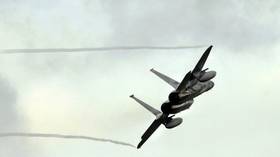Community sues noise polluting Navy and wins
An anti-noise group and the Washington state attorney general have won a lawsuit against the US Navy regarding a cluster of ultra-noisy EA-18G Growler aircraft stationed at nearby Whidbey Island Naval Air Station.
Chief US Magistrate Judge J. Richard Creatura ruled that the Navy had deliberately “turned a blind eye” to the environmental and community impact of bringing more EA-18G Growler aircraft to the base. He further charged that the Navy had specifically selected methods of evaluating data that favored its goals of populating the station with more planes.
In his ruling last week, the judge accused the Navy of acting “at the expense of the public and the environment.”
Not only do the aircraft flying overhead reach noise levels of a deafening 120 decibels (dB) outdoors and as high as 90 dB inside, but planes can be heard zooming by “about every minute or so, right in the middle of the day. It’s completely, absolutely unlivable outside,” one local told The Intercept.
Another suggested the military had unilaterally declared the area a “flight zone” without consulting anyone beneath and has subsequently ignored thousands of noise complaints and lawsuits. The Navy conducts more than 100,000 takeoffs and landings at Whidbey Island per year.
“The Navy created a flight zone. … And you’re like, no it’s not, this is a farm.”U.S. communities are beset by deafening roars from a generation of louder military aircraft — and they are fighting back. https://t.co/34BR5GGbiRBy @ninabermanpic.twitter.com/4zfFV5U44H
— The Intercept (@theintercept) December 20, 2021
The Air Station and the city of Port Townsend, which lies beneath its flight paths, have been at odds since 2012, according to Mayor Michelle Sandoval, who thanked both AG Bob Ferguson and the Citizens of Ebey’s Reserve (COER) for the lawsuits, filed in 2019, that were ultimately rolled into the single suit that Creatura ruled on last week.
The judge specifically found that the Navy had violated the National Environmental Policy Act (NEPA) by “failing to disclose the basis for greenhouse gas emission calculations, failing to quantify the impact of increased operations on classroom learning, failing to take a hard look at species-specific impact on birds, and failing to give detailed consideration to the idea of moving some operations to a base in El Centro,” according to local media.
The judge took the Navy to task for acknowledging that aircraft noise would impact children’s ability to learn but refusing to conduct further analysis on exactly how, lacking the means to quantify that impact. The Navy’s computer models indicated that Port Townsend was unaffected by the increased flights and louder noise from the larger number of planes but, like many computer simulations, they failed to take certain factors into account.
The Navy was also accused of violating the National Environmental Policy Act by failing to adequately analyze the impact that an increased number of planes would have on both the community and the environment. Multiple studies have shown that such sustained loud noises can cause cardiovascular disease and increase the likelihood of dementia, anxiety, and depression, to say nothing of the obvious possibility of hearing loss.
Further charges against the Navy, including accusations of violating the Administrative Procedure Act and the National Historic Preservation Act, were dismissed.
The residents’ victory is only temporary, however. Both sides have 30 days to submit suggestions on how to remediate the problem. The Navy’s final decision may be overturned if it is found to have acted “arbitrarily and capriciously” and not taken a “hard look” at the consequences of bringing in more Growlers – electronic-attack planes created to disable enemy defenses and communications – to the skies over the state of Washington.















